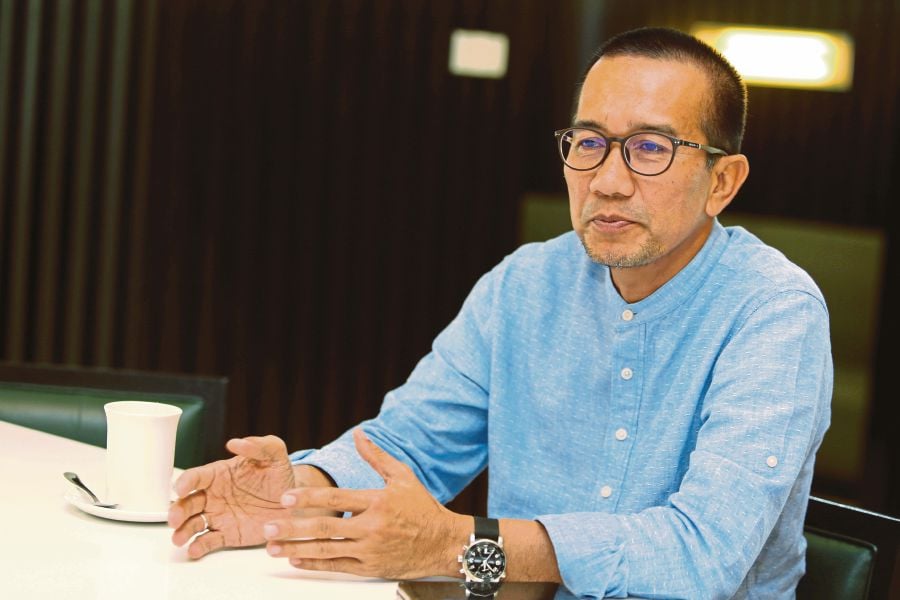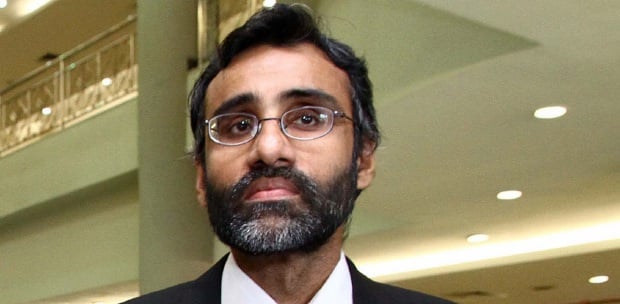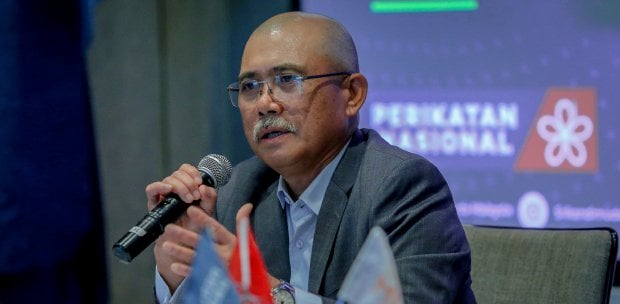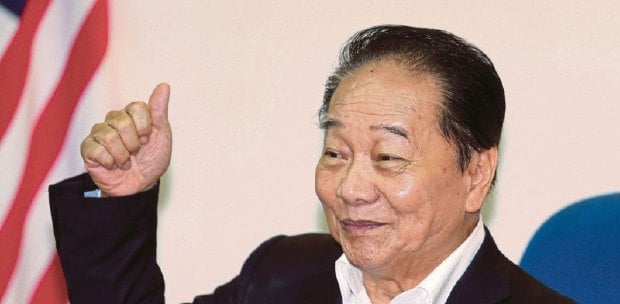PKR may have won the most number of parliamentary seats among Pakatan Harapan’s component parties in the 14th general election, but its presence is undoubtedly lacking in the east coast states, especially Terengganu and Kelantan.
That, however, has not deterred Terengganu PKR chairman Azan Ismail from making a bid for the party’s vice-presidency in the upcoming PKR elections, which will see around 800,000 voters use the new e-voting system to choose their leaders.
NADIA HAMID and ESTHER LANDAU met with Azan recently to discuss his role as the sole vice-presidency candidate from the east coast and the challenges involved.
Q: How do you view the party elections this time around?
A: It’s a lot more critical now compared to before. Two significant figures are contesting the deputy presidency. It appears to be an even fight, given both men’s capabilities. The fight between two camps has given the impression that PKR members are split in two, which is worrying. We had anticipated that once Pakatan Harapan took over the government, PKR would be a solid, dominant party. In the PH structure, we have a solid racial composition and background. There is a real worry over this clash. We don’t want PKR to become a party which limits its membership.
Q: What do you mean?
A: We cannot hold to the perception that PKR is only divided into two camps for the election. This perception has to include two, maybe three or more groups. I believe (PKR de facto leader) Datuk Seri Anwar Ibrahim also wants to be seen as impartial and not siding with anyone. I believe that the presence of other groups can help PKR be seen as a party which does not ‘tie down’ its members.
Q: Why the decision to contest the vice-presidency?
A: On principle, I usually adopt a neutral stand. I don’t side with anyone but we have no representatives from the east coast. We have to understand that the political scenario in the east coast and west coast are vastly different. In the west coast, the people openly support PH but in Terengganu, the majority support Pas. I do not want any more divisions between PH parties in the east coast. As such, I have to work to have PKR prioritise unity in the east coast. To me, whenever there is division, we should not take too long to unite the quarrelling factions. I appeal to the east coast PKR members to avoid disunity. It’s important to prioritise unity in the east coast as the political scenario is massively different from the west coast.
Q: But PKR lost in Terengganu. What are your objectives in contesting the vice-presidency?
A: A simple concept behind the vice-presidency is to represent all its members. The appointment of vice presidents should be done according to regions to ensure they represent a specific area. There should be five VPs whom among others represent the east, north, south, central as well as Sabah and Sarawak. Unfortunately, for now, the elections are based on sentiments. Selangor has the most members at almost 100,000. In Terengganu, there are only 15,000 PKR members. So naturally, candidates from areas with the most members stand a better chance. If we look at it, most of the candidates come from Selangor, such as Nurul Izzah Anwar, Tian Chua, Zuraida Kamarudin. I’m the only one from the east coast. At least I dare to offer myself as a candidate for the east coast, no one else had done this before.
Q: What are the improvements you plan to bring if given the mandate?
A: In Terengganu, issues which require attention are the oil royalty, oil wells and related matters. These have all come under dispute and need to be reviewed. These local issues have not been brought to the national level. Some things have been swept under the carpet. I can safely say that some matters which were deemed ‘lost’ before have since been ‘found.’ The people of Terengganu also have to understand that the state’s constitution is different from other states, such as those concerning its borders.
Q: Some candidates appear to be using Anwar’s influence to gain support.
A: Any political party, even worldwide, use their party’s major symbols (personalities). Umno no longer has one as its president (Datuk Seri Najib Razak) has resigned. Pas is still focused on its president Datuk Seri Abdul Hadi Awang as its standard bearer. MCA, MIC is no exception as their key leaders lost. PH parties are now focused on their own ‘emblems’.
PKR is among the strongest parties in the country with regards to having a strong emblem, in the form of Anwar. No other personality has undergone what he went through, no one has that sort of experience.
His ups and downs in politics cannot be compared to anyone else in Malaysian political history. His position is not just significant in PKR but also political parties in other states.
He is constantly used as a reference point even abroad when discussing political leaders. With his anticipated ascension to the prime minister role, I feel that many parties, not just PKR, will use Anwar’s position as part of their campaign. Anwar has been invited by many countries abroad to give speeches so they can understand his thinking. Other countries have already begun working on the assumption that he will be the PM, which is in line with what PKR members are also doing.
It would not make sense if Anwar, the new PKR president, is not used as a reference point and direction for the party in the future.
Q: Who is your pick in the clash between Rafizi Ramli and Datuk Seri Mohamed Azmin Ali?
A: As I’ve said before, I want to be seen as neutral and as someone who champions unity. I’ve heard some division members voice their support for Azmin, but we cannot disregard the sentiment that Rafizi hails from Terengganu. We cannot reject the fact that he (Rafizi) had worked hard to raise the party’s image, especially in building political confidence within the east coast community. I’m confident that Rafizi is closer to the hearts of the PKR folk. However, I’m not preventing any members from choosing who to support. The east coast folk are rational enough to make their own choices. There is no need to seek guidance from the state leadership. But what the members have to realise is that opportunities are limited and they have to be done in accordance with the law.
Q: The people's sentiments these days seem to be that PKR/PH leaders are the same as those from other parties; they forget their struggles when in power.
A: Firstly, both sides have their own strengths. I have acquaintances and good relationships with politicians from both sides of the divide. This has been the case from 2008, when I first went to Parliament. They are old friends and helped reform Parliament after GE12 (2008). At that time, we were the opposition, and had brought many issues to public attention. In the last general election, we took over the administration of the government. The contributions of old friends cannot be dismissed and forgotten. PKR is a party that does not easily forget the contributions of past leaders. I believe PKR is not like other parties that are greedy and easily forget significant historical events. We do not forget history and the deeds of those who formed the party, even after 20 years. We hope this sentiment will continue, as only parties with values can have a long life span. Umno was shoved aside by the people only when it forgot its struggles. I see we are now going through a new political era, the world is also moving in the same direction. The new generation must get used to this. Other countries are already moving forward and we should not get left behind.
Q: What do the people of Terengganu think about PH?
J: I love the harmony and sense of family in Terengganu. The majority of the people see PH a party which succeeded in taking over the administration of the country from BN. As BN was in power for so long, I see the people are still evaluating what's new. Can the new government carry out their responsibilities better than BN.
The people's sentiment will be the yardstick for the next general election, whether or not the east coast will fol
low the same political pattern as the west coast. The people of Terengganu are also evaluating the Pas leadership to see whether it can fulfil their expectations.
Usually, the people can come to a decision within two years. They will determine whether they are happy or otherwise. For about six months, those on the east coast won't react. After two years, they will be more willing to express their views.
Q: Other countries appear to have the view that our politics are still not mature and open.
A: We do have the political maturity. But things take time with changes in government. This is because it involves a change in the political system and also in the administration of the government. Before this, even though there is a change in leadership, the engine of government has remained the same for 60 years. In such cases, it takes only six months to one year to adapt. But even now with a change in government, only policies have changed such as the Goods and Services Tax (SST) to the Sales and Services Tax (SST). In other countries, when there is a change in government, the entire political system changes. What is, therefore, happening in Malaysia is laudable. There is no upheaval among the people, only from some political leaders. This is, however, normal. If there is no change at all, then it is unnatural and can have a negative impact on the country.
The perception of others with regards Malaysia is important especially when there is a change in government. It they think Malaysia has a static structure, it will then seem as if the political system in the country is tightly controlled.





